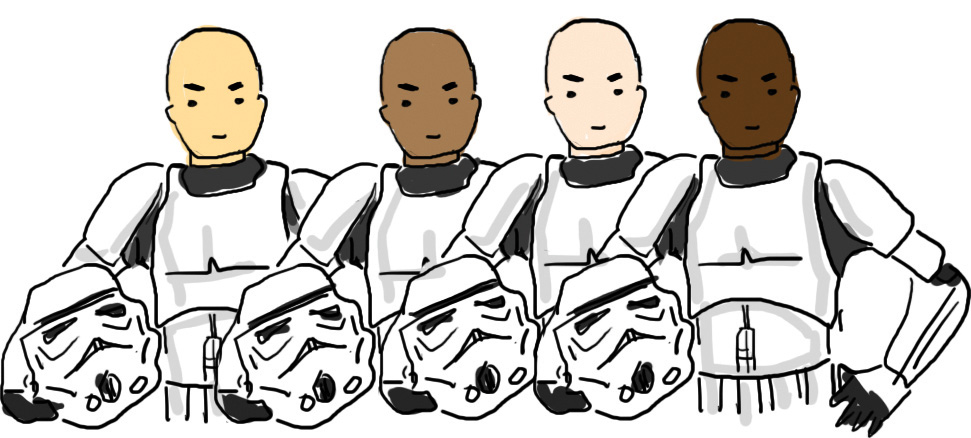
Joanne Rhee
Staff Writer
Illustration by Silvia Quach, Staff Illustrator
Grab your torches and pitchforks everyone, it’s time to #BoycottStarWarsVII for being “racist.” The newest Star Wars trailer was released Mon., Oct. 19 and a certain group of fans were less than pleased when they saw the protagonist of the film. To their dismay, the protagonist was black (gasp)!
What’s more appalling is the abundance of diversity in the film. Inconceivable!
The trailer showed snippets of the new black hero featuring actor John Boyega along with Latino actor Oscar Isaac. There is also a female actress, Daisy Ridley, who is to play a major role in the film as well. Those who boycott Star Wars Episode VII: The Force Awakens claim society is being bombarded with “anti-white propaganda” and themes of “white genocide.”
Only, it’s not.
The real problem with the Hollywood film industry is the lack of diversity and visibility of minorities.
According to a study conducted by the Media, Diversity & Social Change Initiative at the University of Southern California, “only 17 of the 100 top films of 2014 featured a lead or co lead actor from an underrepresented racial and/or ethnic group.” In fact, 73.1 percent of characters in the top 100 films of 2014 were white.
The new Star Wars film isn’t the first time America has experienced an unexpected non-white lead. A new rendition of Annie was released in theaters late 2014. It featured Quvenzhané Wallis, a black actress, as Annie, who has always been portrayed as a redheaded white girl. The movie received negative reviews from critics, and Wallis received negative comments.
Many people justified the backlash by saying Hollywood can’t just change a character’s race when the character was known to be another, but this wasn’t the first time Hollywood played this kind of switcheroo.
The Hunger Games is a popular book and film series. Jennifer Lawrence was cast as the main character, Katniss Everdeen, despite the book describing Katniss as having olive skin and straight black hair. The way the books describe her make her seem anything but anglo-white. Cinna, an important character, is only described as having brown hair. The directors decided to cast Lenny Kravitz, which left many people upset that a black actor played an important character they assumed was white.
It seems that Hollywood has somehow managed to have movies about non-white characters and still lack diversity. Jake Gyllenhall, a white male, prepared for his role as a Persian in Prince of Persia by getting a tan. 21 is a movie “based on a true story” about Asian American students developing a system to win blackjack in Las Vegas, and yet the movie features a white cast with Kevin Spacey playing the the main character who has been written to be white. Most recently, Emma Stone, who is 100 percent white, was cast as Allison Ng in Aloha. Ng is supposed to be one-fourth Chinese and one-fourth Hawaiian. (Director Cameron Crowe finally apologized for the poor casting choice.)
Hollywood could have easily had characters portrayed by actors of their respective races, but they didn’t. Now, people are complaining over having a black protagonist who could very well have been written without having a specific race in mind. It’s refreshing having a strong, black lead in Star Wars for a change, especially given the limited history of black actors and actresses in the franchise.
Mace Windu, played by Samuel L. Jackson, is betrayed by Anakin Skywalker and killed by Darth Sidious. Ahmed Best voiced Jar Jar Binks, who was initially created by Lucas for comic relief. Many people regard Jar Jar as one of the most disliked characters of the franchise. Lando Carlissian has been a smuggler, gambler and general at different points in his life. Initially he betrays his good friends by selling them out to Darth Vadar, but helps them in the end. Oola, Jabba the Hut’s scantily dressed slave dancer, is portrayed by Femi Taylor. Oola dies after trying to resist Jabba the Hut. James Earl Jones and Tony Cox both lend their voices without showing their faces. Jones plays the notorious villain Darth Vadar while Cox plays an Ewok named Widdle who is made fun of by other Ewoks.
There has been a great lack of black actors and actresses throughout the previous six films in the series. Those who have appeared either possess undesirable qualities, untrustworthy traits, were killed off or don’t even show their faces in the first place. Bonus points if that character fits all of the above.
Having a non-white actor playing an important role is a refreshing, welcomed change. It doesn’t promote a white genocide, but rather steps towards a more progressive society that strives to be more inclusive in their casting choices in films.










